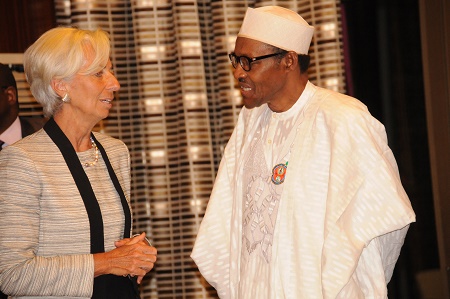
THE Managing Director of the International Monetary Fund (IMF), Ms. Christine Lagarde has expressed confidence in President Muhammadu Buhari’s campaign against corruption but warned the President on the need for fiscal discipline.
Lagarde spoke at a media briefing at the Briefing Room, State House after about more than one hour meeting with the President and his economic team which included Vice President Yemi Osinbajo and the Minister of Finance, Kemi Adeosun, her counterpart in the Budget and National Planning, Sen. Udoma Udo Udoma and the Central Bank of Nigeria, (CBN) Godwin Emefiele among others.
“But what I certainly mentioned to Mr. President was that his fight and his determination to fight corruption and his determination to bring about transparency and accountability at all levels of the economy are very important agenda item and very ambitious goal that needed to be deliberated upon which he, himself is definitely committed to as he indicated this morning and as he inspires his team members,” Lagarde said.
She confirmed that IMF’s evaluation team would visit the country next week to scrutinize the 2016 budget currently before the National Assembly with a view to coming out with the response and guide the country accordingly, noting that the Fund had no policy of interference on how member-countries determine their run their fiscal policies.
She waved aside sentiments that the Fund had come to negotiate with the country on how to obtain fresh loans with stringent conditionalities, noting that the currently had no need for loans. She insisted that the administration must work on fiscal discipline
According to her, “First let me make it clear that I’m not here nor is my team in this country to negotiate a loan with conditionalities. We are not into programme negotiations and frankly at this point in time, given the determination, resilience displayed by the President and his team, I don’t see why an IMF programme will be needed.
“So of course discipline is going to be needed, of course, implementation is going to be key for the objectives and the ambitions to serve the country well, in order for it to be actually sustainable.
“On the current account upfront, we believe that with very clear primary ambition to support the poor people of Nigeria, there could be added flexibility in the monetary policy, particularly if as we think, the price of oil is likely to be possibly low for longer, because clearly the authorities should not deplete the reserves of the country, simply because of rules that will be exceedingly rigid . I’m am not suggesting that the but that rigidity be totally removed but some degree of flexility will be enough.”



